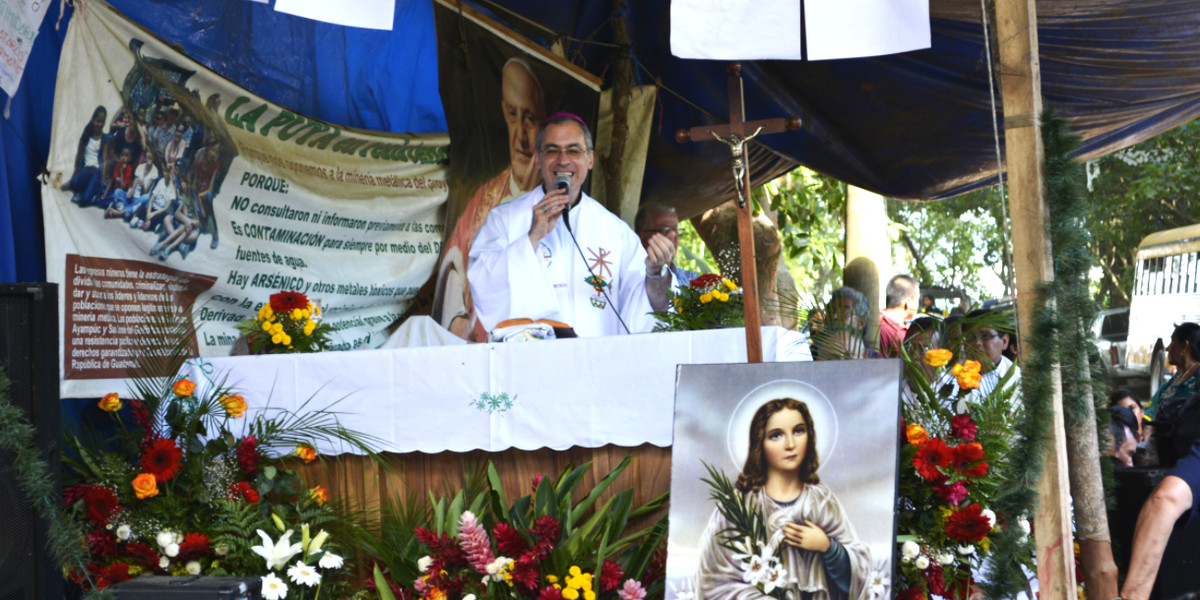PRESS RELEASE
Brussels, 22 April 2025
Faith leaders warn of the harms that the European Commission’s Omnibus Simplification Package will inflict on communities and the environment.
The EU’s duty is to protect human rights and the rule of law, not corporate interests.
Today, faith leaders from the Catholic Church issued statements to alert of the damages the European Commission’s simplification proposal could cause. The Omnibus Package proposes changes to key elements of the Corporate Sustainability Due Diligence Directive (CSDDD). Under the guise of ‘simplification’, such changes would lead to a Directive that has limited impact or no real obligation for companies to address human rights and environmental harm in their supply chains. It took decades for the EU to introduce mandatory due diligence and only three months for the EC to dismantle it. Our religious communities, drawing upon the principle of the dignity of the human person, have joined thousands of voices pushing for mandatory human rights and environmental due diligence, ensuring that those harmed by corporate misconduct can seek justice. Therefore, we received the Omnibus Simplification package with deep concern. The CSDDD has not yet started applying, with no data on its impact and benefits. According to the EU’s Better Regulation Toolbox, at least three years of implementation data are necessary before a law can be properly evaluated and amended.
As recalled by Pope Francis: “The twenty-first century, while maintaining systems of governance inherited from the past, is witnessing a weakening of the power of nation states, chiefly because the economic and financial sector, being transnational, tend to prevail over the political.”
Encyclical Letter, Laudato Si, 175.
The European Commission justified changes to the directive by pointing out the potential burden the CSDDD would bring to Small and medium-sized enterprises (SMEs). However, the CSDDD has integrated protections for SMEs and clarified their responsibility. The CSDDD, in its current form, has the capacity to significantly elevate the European Union’s leadership in sustainability while simultaneously advancing the Commission’s ambitions regarding competitiveness and safeguarding SMEs. Moreover, the Omnibus proposal goes beyond simplifying procedures for SMEs, constituting rather a full-scale deregulation and deviating from established international standards.
As faith leaders, in the face of growing social and ecological crises, we must challenge the mentality that businesses are able to regulate themselves. We have a duty to remind our political leaders that binding legal frameworks are key to prevent economic interests from trumping the common good. This is why we strongly encourage the European Parliament to stand up for human rights against the profit-focused interests of the European Commission, ensuring that the CSDDD remains free from amendments that could harm both people and the planet. This is particularly alarming amid the ongoing climate crisis and environmental decline. It is worth highlighting that the voices that are not listened to are the voices of the victims of human rights violations. The Omnibus proposal represents a major setback for them seeking justice and remedy. EU Member States would no longer have an obligation to establish civil liability for harm caused by a company’s failure to meet its due diligence obligations.
A European Union that values profit over life becomes an accomplice to the suffering and loss that our Common Home and our global community may face.
“The EU supply chain directive is an important sign of hope. Do not destroy this hope. Implement the EU Due Diligence Directive instead of undermining it!”
Heiner Wilmer, Bishop of Hildesheim, Germany
“If the Omnibus Proposal is approved without further debate, its consequences will be severe: it will lead to the violation of human rights for workers while increasing corporate profits.”
Giovanni Ricchiuti, Archbishop of Acerenza, Italy
” This is why a thorough analysis is essential, one that truly considers the whole picture and looks to the future with foresight. A future that risks being denied the possibility of shared wellbeing, not just in Europe, but across the entire world.”
Luigi Renna, Archbishop of Catania, Italy
This call is supported by CIDSE, the international family of Catholic social justice organisations, Caritas Europa, Justice and Peace Europe, Misereor and Pax Christi International.
CIDSE contact: Susana Hernández Torres, Corporate Regulation Officer, CIDSE (hernandez(at)cidse.org)
Cover photo: Archbishop Antonio Aznárez Cobo of Spain celebrating Mass with communities affected by mining in La Puya, Guatemala. 2014. Credit: Delmi Arriaza/CIDSE.

